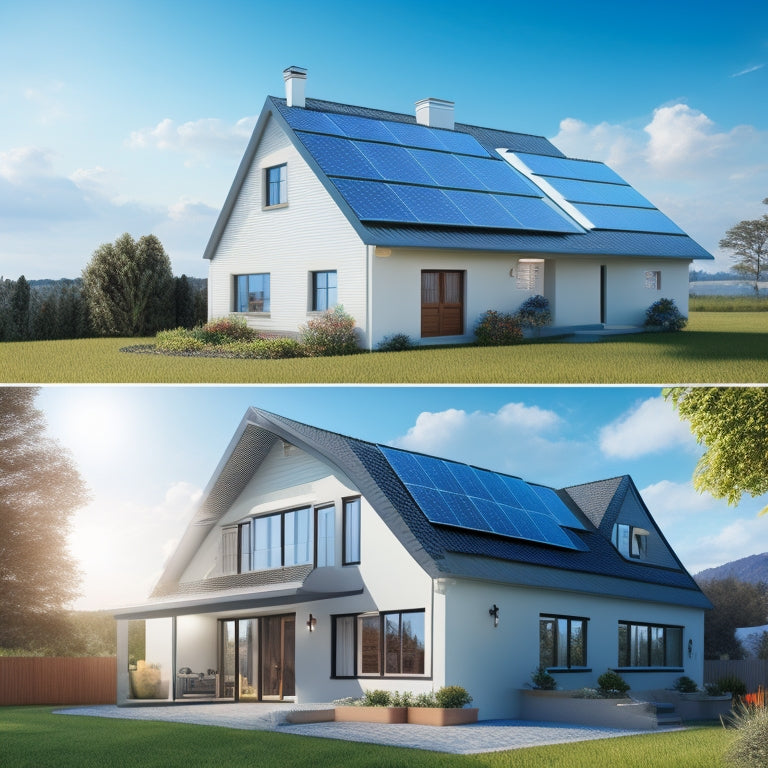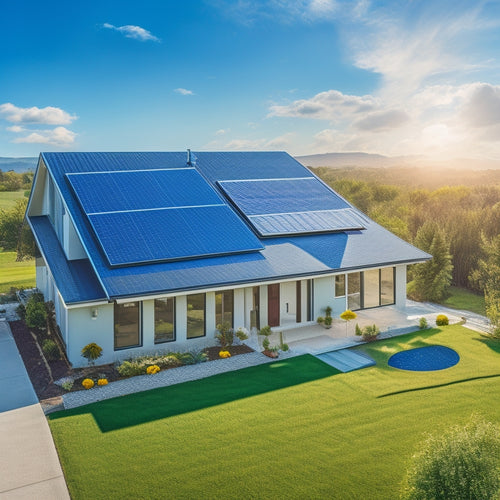
10 Best Residential Panel Costs Vs Savings Revealed
Share
You're considering residential solar panels, and you want to know the costs versus savings. The national average cost of solar panels is $2.95 per watt, with a total upfront cost of $15,000 to $30,000+ for a residential system. Factors like system size, panel quality, and installer reputation influence the cost. Average cost of solar energy is 3-5 cents per kilowatt-hour. You'll want to understand the factors affecting costs, like energy needs, equipment quality, and labor costs. Now that you have a sense of the costs, you can weigh them against the benefits, including federal incentives, reduced energy bills, and increased property value - and there's more to explore beyond these initial insights.
Key Takeaways
• The national average cost of solar panels is $2.95 per watt, with total upfront costs ranging from $15,000 to over $30,000.
• System size, panel quality, and installer reputation are key factors influencing the cost of a residential solar panel system.
• The average cost of solar energy is 3-5 cents per kilowatt-hour, making it a competitive option to traditional energy sources.
• Federal incentives like the Solar Investment Tax Credit (ITC) and state policies like net metering laws can significantly offset installation costs.
• Researching and comparing quotes from different companies is crucial to finding the best residential solar panel costs and maximizing savings.
National Average Solar Panel Cost
According to the latest data from the Solar Energy Industries Association, the national average cost of solar panels in the United States currently stands at around $2.95 per watt, with the total upfront cost of a typical residential solar panel system ranging from $15,000 to $30,000 or more, depending on the system's size and quality.
As you consider investing in solar energy, it's crucial to understand the costs involved. Fortunately, you can take advantage of Federal Incentives, such as the Solar Investment Tax Credit (ITC), which allows you to claim a credit of 26% of the total cost of your solar panel system.
Additionally, State Policies, like net metering laws and renewable portfolio standards, can also help reduce the cost of going solar. By combining these incentives, you can significantly reduce the upfront cost of your solar panel system.
For instance, if you invest in a $20,000 system, you could claim a $5,200 tax credit, bringing the net cost down to $14,800.
Cost of Solar Panels for Home
When calculating the cost of solar panels for your home, you'll need to take into account the size of the system, the quality of the equipment, and the installation company's labor costs, as these factors can greatly impact the overall expense.
The size of the system is determined by your energy needs, which are influenced by factors like your home's energy efficiency and home decor. For instance, if you have energy-efficient appliances and LED lighting, you may require a smaller system.
High-quality equipment, such as premium solar panels and inverters, can increase the upfront cost, but they can also provide better performance and durability. Additionally, the installation company's labor costs can vary depending on their expertise and reputation. Be sure to research and compare quotes from different companies to find the best value.
On average, the total cost of solar panels for your home can range from $15,000 to $30,000 or more, depending on the factors mentioned above. However, with the potential to save up to $500 per year on your energy bills, investing in solar panels can be a smart decision for homeowners seeking energy efficiency and a reduced carbon footprint.
Solar Panel System Installation Costs
You'll typically pay between $2.50 and $3.50 per watt for the installation of a solar panel system, depending on the complexity of the job and the installer's level of expertise. This cost includes the panels themselves, as well as the labor, equipment, and permits required for a successful installation.
Several factors can influence the final cost of your solar panel system installation. These include:
- Panel Quality: Higher-efficiency panels with a longer warranty period will generally cost more than lower-efficiency panels with a shorter warranty.
- Installation Timeline: Rushed installations or those with tight deadlines may incur additional costs due to expedited shipping or overtime labor.
- System Size and Complexity: Larger systems or those with multiple inverters, trackers, or energy storage systems will require more materials and labor, increasing the overall cost.
Keep in mind that while these factors can drive up costs, a high-quality installation with a reputable installer will ultimately provide more value and savings in the long run.
Average Cost of Solar Energy
Your average cost of solar energy is much lower than traditional fossil fuels, with the national average hovering around 3-5 cents per kilowatt-hour (kWh).
This reduced cost is largely due to the increasing energy efficiency of solar panels, which can convert up to 22% of sunlight into electricity.
By harnessing the power of the sun, you're not only saving money but also reducing your environmental impact.
The shift towards renewable energy sources like solar power is essential in mitigating climate change and promoting a sustainable future.
With solar energy, you're producing clean electricity, minimizing greenhouse gas emissions, and decreasing your reliance on fossil fuels.
As the world moves towards a cleaner, greener future, solar energy is becoming an increasingly attractive option for homeowners.
Residential Solar Panel Price Range
The cost of residential solar panels varies widely, ranging from around $15,000 to over $30,000 for a typical single-family home installation, depending on factors such as system size, panel quality, and installation company. As you consider investing in solar energy, it's essential to understand the price range and what affects it.
When evaluating residential solar panel prices, you'll notice that panel quality plays a significant role. High-efficiency panels with higher wattage output will generally cost more than lower-efficiency options. Additionally, the installation company's experience, reputation, and certifications can impact the overall cost.
Here are some key factors to consider when evaluating residential solar panel prices:
-
System size: Larger systems with more panels will cost more than smaller systems.
-
Panel quality: High-efficiency panels with higher wattage output will generally cost more than lower-efficiency options.
-
Installation company: The installation company's experience, reputation, and certifications can impact the overall cost, with more reputable companies often charging more.
Solar Panel Cost Per Watt
When evaluating solar panel prices, a key metric to take into account is the cost per watt, which currently ranges from $2.50 to $3.50 per watt, depending on the system's specifications and installation company. This cost per watt is a critical factor in determining the overall affordability of a solar energy system.
As you consider different options, keep in mind that higher-efficiency panels typically come at a higher cost per watt. However, these panels can provide significant efficiency gains, generating more power per hour of sunlight.
Another key consideration is government incentives, which can help offset the upfront cost of a solar energy system. By factoring in the cost per watt and available incentives, you can make an informed decision about which system is right for you.
Solar Energy System Installation Cost
When contemplating installing a solar energy system, you're likely wondering about the installation cost. On average, homeowners can expect to pay between $15,000 and $30,000 for a standard residential solar energy system installation, with the overall cost depending on factors such as system size, panel efficiency, and local labor costs.
However, it's crucial to ponder the benefits that come with this investment. Here are a few key advantages:
-
Energy Efficiency: Solar energy systems can greatly reduce your reliance on the grid, leading to lower energy bills and a smaller carbon footprint.
-
Government Incentives: You may be eligible for government incentives, such as tax credits, which can help offset the upfront cost of installation.
-
Increased Property Value: Installing a solar energy system can boost your property value, making your home more attractive to potential buyers if you decide to sell in the future.
Residential Solar Panel System Cost
You'll need to take into account several factors when calculating the cost of a residential solar panel system, including the type and quality of equipment, system size, and installation company. The quality of equipment can greatly impact the overall cost, with high-efficiency panels and premium inverters being more expensive.
System size is also a major factor, as larger systems require more equipment and installation time. Additionally, the installation company's reputation, experience, and certifications can influence the cost.
Furthermore, you should take into account the Solar Incentives available in your area, such as tax credits and rebates, which can help reduce the upfront cost. Energy Efficiency is also an important aspect to think about, as a more efficient system will generate more power per hour of sunlight, resulting in greater savings over time.
On average, the cost of a residential solar panel system ranges from $2.50 to $3.50 per watt, with the total cost depending on the system size. For a typical residential system, the total cost can range from $15,000 to $30,000 or more, before factoring in incentives and rebates.
Cost of Solar Electricity Generation
Understanding the cost of solar electricity generation is important in accurately estimating your potential savings when generating electricity through solar power. This can help reduce your reliance on the grid and lower your energy bills.
As you consider moving towards solar energy, it's vital to understand the costs involved in generating electricity.
Here are key factors affecting the cost of solar electricity generation:
-
Grid Parity: The point at which the cost of solar electricity generation equals or falls below the grid's electricity prices. This milestone is critical in making solar energy a viable alternative.
-
Carbon Pricing: Governments are implementing carbon pricing mechanisms to discourage fossil fuel usage. As carbon prices rise, the cost of solar electricity generation becomes more competitive, making it a more attractive option.
-
System Efficiency: The efficiency of your solar panel system directly impacts the cost of electricity generation. A more efficient system means lower costs and higher savings.
Solar Panel Installation Price Range
As you explore the solar panel installation price range, you'll notice that the cost varies greatly depending on several key factors.
The size of the system, complexity of the installation, and location of your residence all play an important role in determining the final cost.
System Size Impacts Cost
Understanding how system size impacts cost is crucial when considering investing in solar power. A larger system will generate more electricity, but it will also increase your upfront expenditure.
When designing your system, you'll need to balance energy efficiency with cost considerations. Here are some key factors to keep in mind:
-
System Design: A well-designed system will maximize energy production while minimizing costs. A professional installer will assess your energy needs and design a system that meets your requirements.
-
Energy Efficiency: Larger systems often have higher energy efficiency ratings, but they also come with higher price tags. You'll need to weigh the benefits of increased energy production against the added cost.
-
Scalability: If you're not ready to invest in a large system upfront, consider starting with a smaller system that can be expanded as needed. This approach can help you spread the cost over time.
Installation Complexity Matters
Your solar panel installation price range will depend on the complexity of the job, which can vary substantially depending on factors such as roof size, shape, and material. For instance, a roof with multiple skylights, vents, or chimneys will require more labor and materials, increasing the overall cost.
Additionally, the roof's orientation can impact the installation complexity. If your roof has a complex orientation, such as multiple levels or angles, it may require specialized equipment and more time to complete, adding to the cost.
The electrical infrastructure of your home is another important factor in determining the installation complexity. If your home has outdated electrical infrastructure, it may need to be upgraded to support the solar panel system, which can add to the overall cost.
Moreover, if your home has a complex electrical system, such as multiple electrical panels or sub-panels, it may require more time and expertise to ensure a safe and efficient installation. Understanding these complexities will help you better estimate the installation cost and plan your solar panel project accordingly.
Location Affects Pricing
Geographic location notably influences the solar panel installation price range. Installers in urban areas typically charge more than those in rural areas. Regional tariffs and climate zones have a substantial impact on the final cost. Installers in areas with high labor costs, such as cities, tend to charge more.
Here are some key location-based factors to keep in mind:
-
Urban vs. Rural: Installation prices can vary by up to 20% depending on the location, with urban areas typically being more expensive.
-
Climate Zones: Installers may charge more in areas with extreme weather conditions, such as high-temperature or high-wind zones, which require specialized equipment and installation techniques.
-
Regional Tariffs: Local and state-level incentives, such as tax credits or rebates, can reduce the overall cost of installation, making solar panels more accessible in certain regions.
Keep these location-specific factors in mind as you navigate the solar panel installation market. You'll be better equipped to make an informed decision about your renewable energy investment.
Frequently Asked Questions
Can I Install Solar Panels on a Rented Property?
You can install solar panels on a rented property, but you'll need your landlord's agreement and a clear understanding of the benefits, such as reduced energy bills, that will be split between you and your landlord.
Do Solar Panels Work During Power Outages?
Did you know that 70% of power outages last less than an hour? Unfortunately, you'll still be in the dark during outages with standard solar panels, but with an emergency backup system, you'll maintain grid resilience and keep the lights on!
Are Solar Panels Resistant to Hail Damage?
You're wondering if solar panels can withstand hail damage. The answer is yes, most solar panels are designed to resist hail storms, with weather durability testing ensuring they can withstand impacts from hail up to 1 inch in diameter.
Can I Sell Excess Energy Back to the Grid?
As you harness the sun's power, imagine selling excess energy back to the grid like a merchant trading valuable goods. With Net Metering, you can do just that, achieving Grid Parity and offsetting your consumption.
Do Solar Panels Void My Roof's Warranty?
You're wondering if solar panels void your roof's warranty. Typically, they don't, but it depends on your roof material and installation quality. Make sure your contractor follows manufacturer guidelines to avoid insurance claims and potential warranty issues.
Related Posts
-

What Are the Best Green Vehicle Product Platforms?
You're in the market for eco-friendly vehicles and wondering which platforms cater to your sustainable lifestyle. Top...
-

5 Tips for Efficient Last Mile EV Delivery
You're looking to supercharge your last mile EV delivery operations. Start by optimizing your fleet operations to red...
-

5 Best Steps to Installing Solar Panels at Home
You're about to start on a journey to harness the power of solar energy at home. First, assess your home's solar pote...


